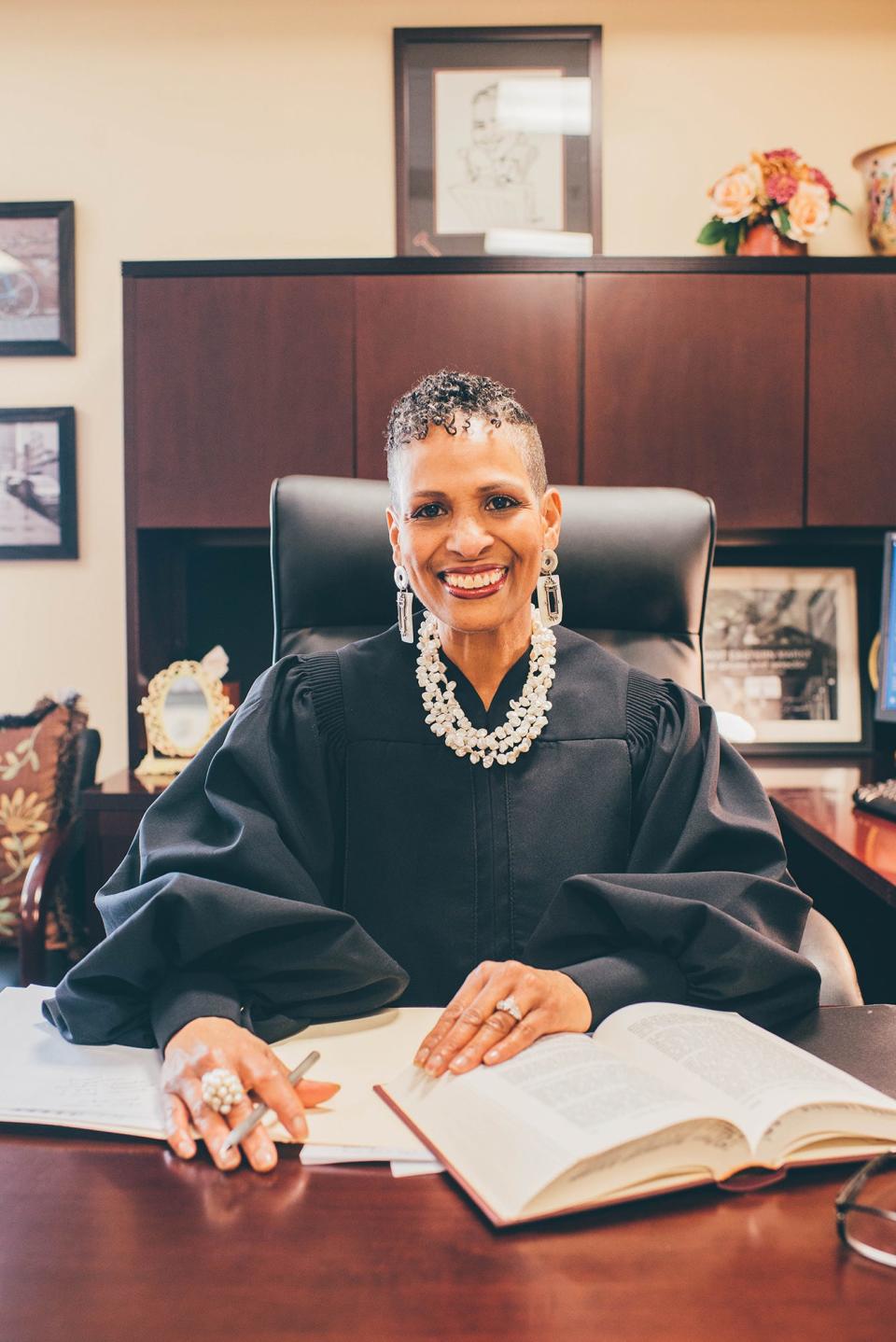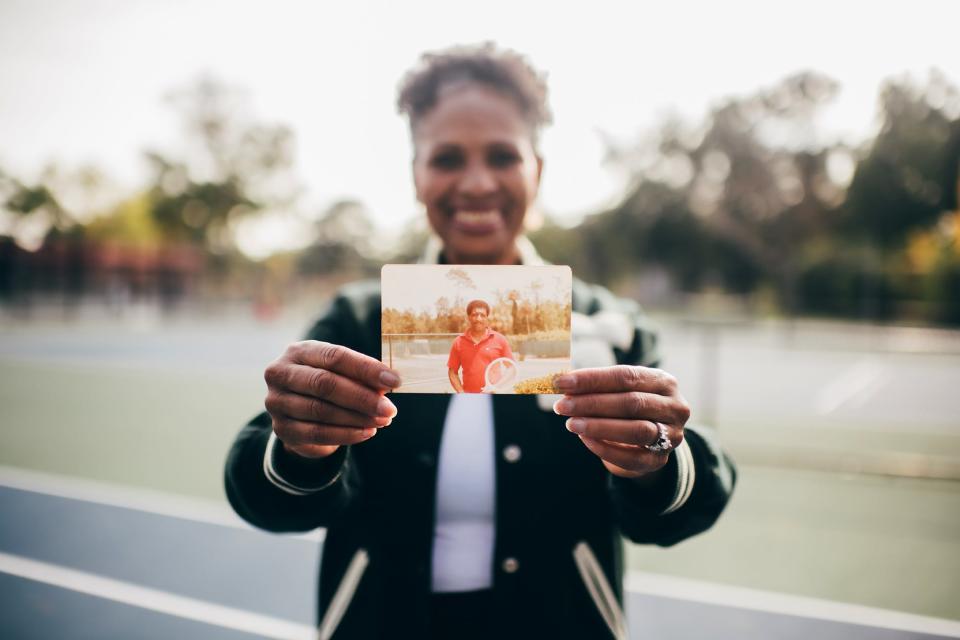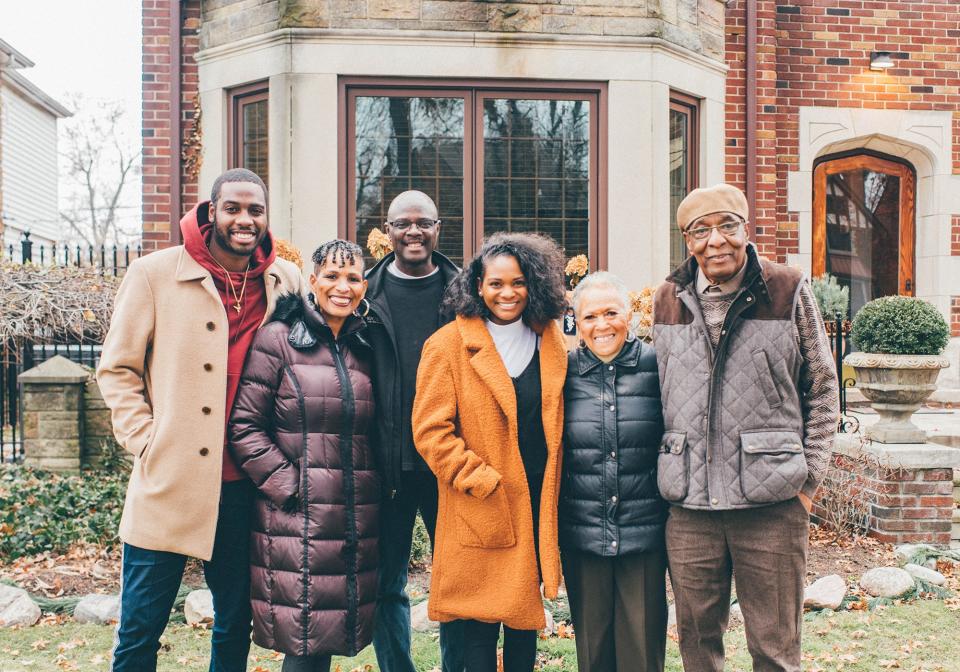Parents, tennis shaped life of Detroit Judge Donna Robinson Milhouse
- Oops!Something went wrong.Please try again later.
With more than 20 years on the bench, Donna Robinson Milhouse, a 36th District Court judge, has seen a full spectrum of emotions in a courtroom.
But on the afternoon of Sept. 8, it was the 64-year-old Milhouse who was screaming — at a TV screen in her northwest Detroit home — as she watched Coco Gauff win the U.S. Open Tennis Championship.
During a compelling three-set match, Gauff dropped the first set before staging a furious comeback in the women’s singles final to defeat Aryna Sabalenka of Belarus, becoming the first American teenager to win the U.S. Open since Serena Williams in 1999.

And Milhouse played right alongside Gauff — in her own way.
“I was screaming at the TV like Coco could hear me,” said Milhouse, who admitted that her screams and cheers were followed by nervous pacing throughout her house in Detroit’s University District while the match played out. “I was yelling at the top of my lungs and the next day I lost my voice. I was just really excited for her.
“When Coco lost the first set, I was like ‘Doggone it!’ But then she started playing the heck out of it. For her to be resilient like that was amazing. Coco turned the momentum around on a big stage and it was beautiful. I’m just so glad that I was able to watch it here. I said that day that after 4 p.m., I will not make any plans — I had to watch that match.”
On Tuesday evening, while nestled in a comfortable chair in her home, near one of the spots where she watched the championship match, Milhouse explained that her deep connection to tennis and support for young African American women striving for greatness has a lot to do with her own early Detroit journey. As she tells it, because of two loving parents — Barbara and the late Donald Robinson — she had to participate in activities that broadened her horizons. And one of those activities provided a whole new world for Milhouse.
“My mother, the school (music) teacher, who was off during the summers, found out about these free sports (programs),” Milhouse, the oldest of Barbara and Donald Robinson’s three children, recalled. “I was 12, Chris was 11 and Anthony would have been 6, and my mother signed us up for every single thing. We had golf lessons, where we went to Rackham; then we had bowling lessons at a bowling alley on Eight Mile and Greenfield, and I enjoyed that because we got a hot dog, chips and a pop; we went to Henry Ford High School for swimming lessons with Ms. Peggy (the instructor), and tennis was on the courts at Vandenburg (Elementary) School (located at 15000 Trojan St., in a building that now houses the Jalen Rose Academy).
“We would go to tennis from 12 until 3, and tennis really stuck for me.”

In this instance, Milhouse’s use of the word “stuck” does not mean she was confined to one part of Detroit. As Milhouse went on to explain, the experience on the Vandenburg courts led to her being part of a tennis “community,” which included participating in National Junior Tennis League events that took her to parks across the city, where she honed her skills and learned how to compete. Along the way, Milhouse received tutelage from master teachers like Allison Scruggs-Tookes, a Wayne State University Athletic Hall of Fame inductee, who also was a stellar collegiate tennis player at Michigan State; and Eddie and Inez Frazier, who both had an eye for spotting young talent at Detroit courts — including the courts at Northwestern High School — and were affectionately known by Milhouse and many other young players as “Uncle Eddie” and “Aunt Inez.”
But in 1977, as Milhouse approached graduation from Immaculata High School, which did not have a tennis team, no one did more to help her secure a scholarship for college than her father.
“My dad, Donald Lee Robinson, was reading either the Free Press or the News, and he read about Title IX, which brought more parity to women’s sports,” Milhouse recalled Tuesday evening while looking through an album with photos from her youth tennis days. “Lucy Parker, who was the women’s tennis coach at Eastern Michigan, was in the article. And maybe she said something like ‘We have scholarships available for women,’ and Dad called her up.

“We used to hit at the Dearborn Racket Club in the winter and Lucy Parker arranged to come out to see me hit — and I may have also played some games. Afterward, she offered me a scholarship covering full tuition. And a year later, I received tuition and either room or board was added.”
As a freshman at Eastern Michigan, Milhouse once put her hand-eye coordination and competitive spirit to use during an intramural table tennis tournament, earning the respect of the other competitors by winning the women’s division. But in order to win the entire tournament, she needed to take down the champion of the men’s division, and a good friend of the male champion believed his buddy could not be defeated.
“His friend kept telling me, 'You’re good, but you can’t beat Otis Milhouse,' ” recalls the proud product of the Metropolitan Racket Club and the Motor City Tennis Club, whose signature on school papers read: "Donna Robinson." “He said that to me about three times and I finally said: ‘Who the heck is Otis Milhouse?’ Then we played, and let me tell you something, he beat me because he had spin like Aunt Inez!”
Milhouse almost tumbled out of her chair with laughter Tuesday evening after telling the story about how she met her future husband. The sheer exuberance in her voice lets you know that the lifelong Detroiter has no doubt regaled others many times with the story of how she met Otis, as the couple have been married now for 38 years.
And while she could not quite win the intramural table tennis tournament, as early as her freshman year, Milhouse was being identified as a student destined for big things in the future. She keeps an article from the Nov. 9, 1977, edition of the EMU Candids newspaper as a reminder. In a story written by staff writer Dori Worhach, Milhouse shared that she was successfully balancing playing tennis with her “academic responsibilities.” The article identified her family’s home as being on Freeland Street in Detroit at the time, and said Milhouse would declare business as her undergraduate major. But there was a little more to her story that was not told, because before she arrived at Eastern, Milhouse already was eyeing a law career. And the inspiration behind that dream, again, was her father.

“I became interested in the law in high school because my dad was appointed fire marshal (for the city of Detroit) in 1974, and then a few years later he was appointed (fire) chief and the union challenged it,” Milhouse explained, her voice becoming noticeably more somber. “The fire marshal is over fire prevention, and they said he didn’t have enough time in the firefighting division. There was a lawsuit filed about it and affirmative action was at the forefront of the whole thing.
"Eventually, Dad went back to fire marshal. But part of the affirmative action argument was that they weren't hiring Blacks for that (firefighting) division at that time, so how are we going to have all of that time in that division when Blacks hadn't been hired? I became very interested in that, and during my senior year in high school I wrote a paper on affirmative action. That paper was about my dad, and I used it for my research and writing class and my government course.”
After sharing the story, Milhouse, who describes being a judge as "the most humbling thing I have ever done," lightened the mood by joking about being able to use the same paper on affirmative action for two classes in high school. Then the smile on the face of the 1984 Wayne State University Law School graduate completely returned when Milhouse was asked about the headlines that have recently been made by judges and attorneys who are also Black women. While she enthusiastically nodded in agreement to acknowledge that this is indeed a special time for Black women in the law, Milhouse, who serves a court with jurisdiction over general civil, landlord tenant, small claims, traffic and criminal matters within the city of Detroit, also made it known that she and other officers of the court with Detroit roots may have a slightly different take than the rest of the world.

“Of course, we’re all proud of the newest Supreme Court Justice (Ketanji Brown Jackson) and we celebrate the other Black women that we are seeing on the world stage. But I don’t know that we gather together to specifically talk about that here, because at least in the Detroit community, it seems natural,” said Milhouse, the proud mother of two adult children — Justin and Natalie — who also has honored her parents and city during her legal career through frequent volunteer service, including speaking regularly at schools and community gatherings. “When you have those significant firsts, you hope it won’t be the last. And I think we’ve had significant pioneers in the law longer than a lot of major cities.
“You don’t break down those walls unless you have contact and are exposed to people in a way that your true essence is displayed. We’ve had a diverse interplay of ideas and perspectives and experiences. That’s the way you want it to be and it’s working out for the community as a whole — across the board.”
Scott Talley is a native Detroiter, a proud product of Detroit Public Schools and lifelong lover of Detroit culture in all of its diverse forms. In his second tour with the Free Press, which he grew up reading as a child, he is excited and humbled to cover the city’s neighborhoods and the many interesting people who define its various communities. Contact him at: stalley@freepress.com or follow him on Twitter @STalleyfreep. Read more of Scott's stories at www.freep.com/mosaic/detroit-is/. Please help us grow great community-focused journalism by becoming a subscriber
This article originally appeared on Detroit Free Press: Detroit Judge Donna Robinson Milhouse shaped by parents, tennis

